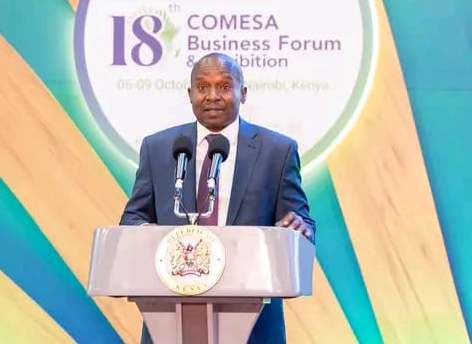

Deputy President Kithure Kindiki has called on African nations to take full control of their economic destiny through technology, value addition, and partnerships.
Speaking during the 18th COMESA business forum in Nairobi, Kindiki described the meeting as a “critical confluence of minds and purpose,” bringing together leaders from across the continent to chart a unified course for Africa’s economic renewal.
He commended the COMESA-EU partnership for fostering dialogue that enhances regional integration, strengthens market linkages, and supports small and medium enterprises (SMEs) to meet global competitiveness standards.
Kindiki noted that Kenya remains a leading exporter of agricultural commodities but faces persistent challenges, including high freight costs, climate pressures, and global supply chain disruptions.
The CS outlined government strategies aimed at shifting from raw exports to value-added production, investing in modern infrastructure, and promoting sea freight to reduce both transportation costs and carbon emissions.
“Value addition offers the best opportunity for higher returns, industrialisation, and technological advancement,” Kindiki said, calling for stronger collaboration between governments and the private sector to accelerate industrial growth.
A key highlight of Kindiki’s address was the emphasis on digitisation as the defining force of Africa’s next economic era.
Announcing that Kenya will chair the COMESA Organ Committee, he pledged to lead efforts that anchor regional integration on digital transformation.
He cited innovations such as the Electronic Certificate of Origin (ECO) and Smart Border Solutions, which are already easing cross-border trade by eliminating non-tariff barriers and improving efficiency.
The CS urged regional innovators to create technology-driven solutions that empower women and youth, who he described as “the true engines of Africa’s economic transformation.”
He summarised his message around three key pillars, people, technology, and partnerships, saying these would define Africa’s position in global trade over the next decade.
During the same session, Benjamin Tito, Director of Regional Coordination at the Agriculture and Food Authority (AFA), reinforced Kindiki’s message by emphasising the growing role of digital platforms in transforming agriculture and improving farmers’ access to markets.
Tito said technology is enabling farmers to access real-time data on prices, weather, and seed varieties while building stronger linkages with buyers.
He highlighted the COMESA digital platform as a gateway to Africa’s intra-continental trade, helping Kenyan producers access regional markets without the bureaucratic restrictions often found in European trade.
On macadamia exports, Tito reminded stakeholders that the export of raw nuts is prohibited without authorisation from the Agriculture Cabinet Secretary, explaining that this policy safeguards local value addition and job creation.
“When we export raw produce, we export jobs,” he said.
Warehouse Receipt System Council (WRSC) CEO Lucy Komen also took to the podium to share how digital warehouse receipt systems are transforming post-harvest management and agricultural finance.
She revealed that farmers can now store their produce in certified warehouses and use digital receipts as bankable collateral, unlocking access to affordable credit.
Komen added that 16 financial institutions are already developing warehouse receipt financing products and that integration with blockchain technology will enhance traceability, transparency, and trust in regional trade.
The 18th COMESA Business Forum concluded on a high note, with delegates expressing optimism that digitalisation, innovation, and value addition would drive Africa toward a prosperous, inclusive, and sustainable economic future.

















